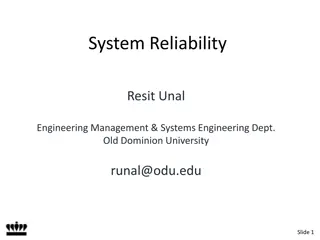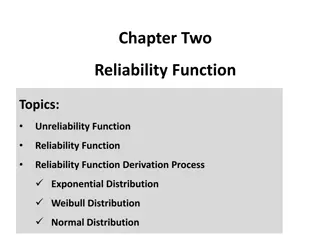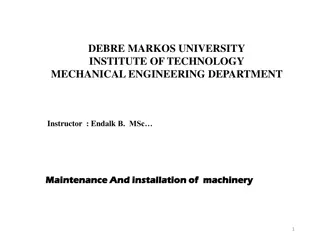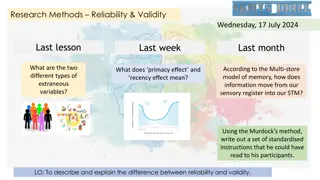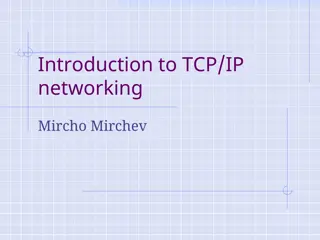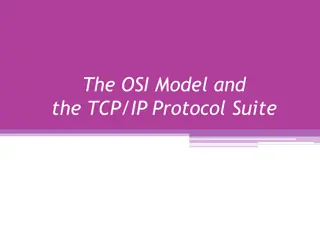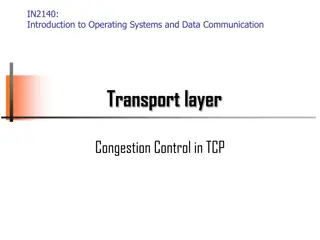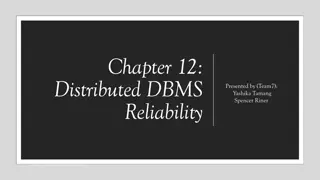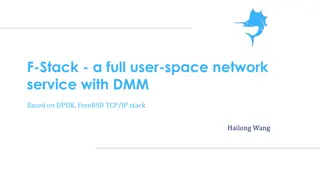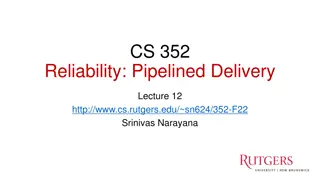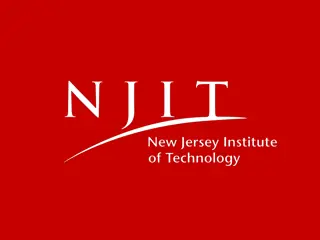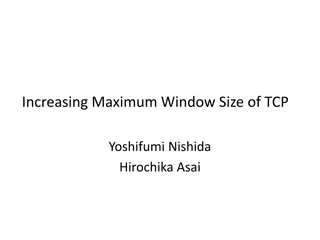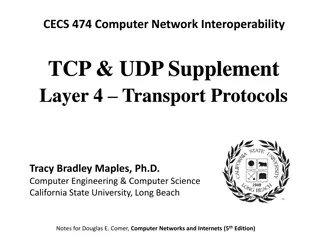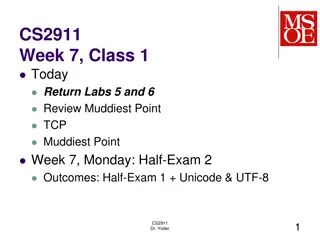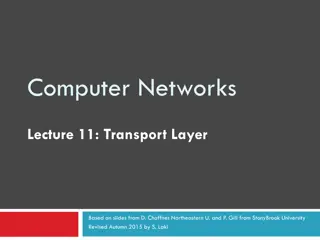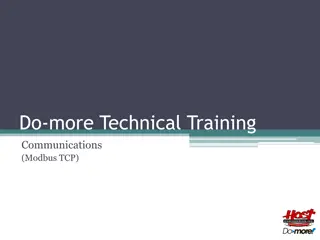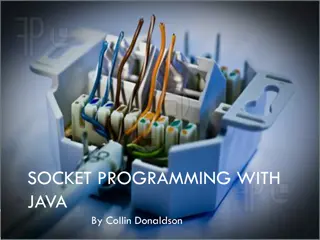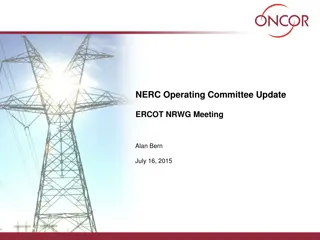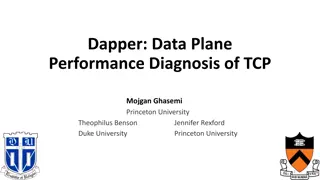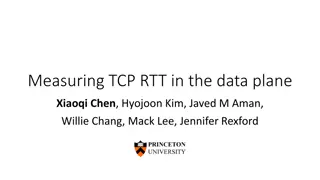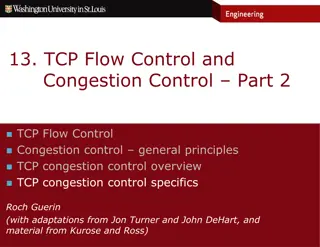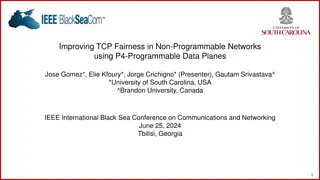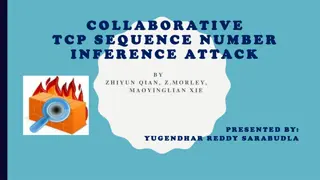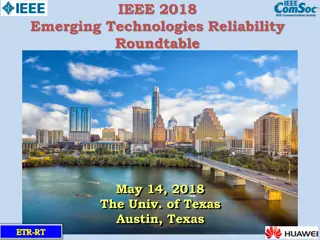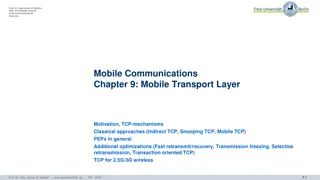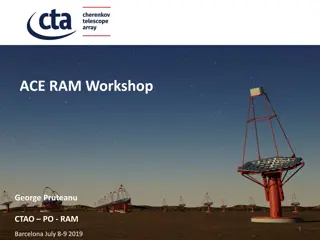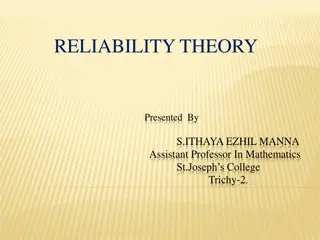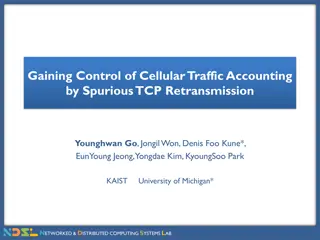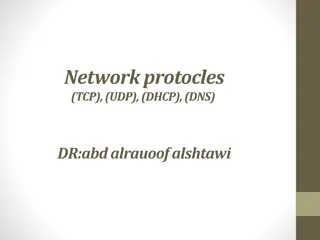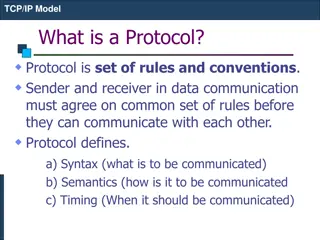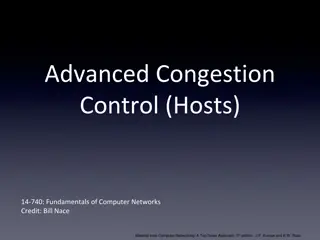TIBCO TCP-TM Exam Overview & TCP BusinessEvents Exam Questions
Start here---https:\/\/bit.ly\/42Mp9mW---Get complete detail on TCP-TM exam guide to crack Professional. You can collect all information on TCP-TM tutorial, practice test, books, study material, exam questions, and syllabus. Firm your knowledge on Professional and get ready to crack TCP-TM certifica
3 views • 14 slides
TIBCO TCP-BE Exam Success: Key Concepts and Practice Sessions
Begin your journey here---https:\/\/bit.ly\/3UUOF7y---Discover comprehensive details on the TCP-BE exam guide to excel as a Professional. Gather all the essential information on TCP-BE tutorials, practice tests, books, study materials, exam questions, and syllabus. Strengthen your expertise in Profe
3 views • 14 slides
Understanding System Reliability in Engineering
System Reliability in Science/Engineering involves understanding how products/systems work, as well as the ways they fail and the effects of failures. Reliability is the probability that a system will perform as expected under given conditions and play a crucial role in the design phase to mitigate
0 views • 19 slides
Understanding Reliability Functions in Data Analysis
Reliability functions play a crucial role in data analysis, providing insights into the probability of success or failure over time. This chapter delves into topics like unreliability functions, derivation processes for reliability functions using distributions like exponential, Weibull, and normal.
0 views • 19 slides
Understanding Reliability in Mechanical Engineering
Reliability in mechanical engineering pertains to the ability of a product to perform as expected over a specified period under defined operational conditions. This article delves into the factors influencing reliability, such as numerical value, intended function, product life, and operating condit
0 views • 61 slides
Understanding Research Methods: Reliability and Validity in Psychological Studies
In psychological research, understanding reliability and validity is crucial. Reliability refers to consistency in measurements, while validity focuses on whether the results accurately represent the phenomenon being studied. Ensuring both reliability and validity enhances the credibility of researc
0 views • 13 slides
Understanding TCP/IP Networking Fundamentals
Explore the basics of TCP/IP networking, including protocols like IP, UDP, RTP, and more. Learn about the structure of the Internet, the role of routers, OSI network model, TCP/IP network model, and packet encapsulation in data transmission. Gain insights into the layers of the OSI model and the TCP
1 views • 36 slides
Understanding OSI Model and TCP/IP Protocol Suite
Explore the concept of layering in data communication, comparing the OSI model and TCP/IP protocol suite. Learn about protocol layers, protocol hierarchies, and the functionality of each layer in these models. Discover the interrelationships between layers and the evolution from OSI to TCP/IP.
5 views • 57 slides
Understanding TCP Congestion Control in Operating Systems
TCP congestion control is crucial for maintaining stability and efficient data transmission in computer networks. This article delves into the history and development of congestion control algorithms, highlighting key components such as additive-increase, multiplicative-decrease, and slow-start reac
0 views • 12 slides
Understanding Mobile Computing and TCP/IP Protocol Suite
Mobile computing is crucial for continuous internet connectivity regardless of physical location. The TCP/IP protocol suite, consisting of Transmission Control Protocol (TCP) and Internet Protocol (IP), forms the backbone of internet infrastructure. IP addressing and mobility challenges are addresse
1 views • 51 slides
Distributed DBMS Reliability Overview
This chapter delves into the critical aspect of reliability in distributed database management systems (DBMS). It explores the concepts, measures, types of faults, and the significance of maintaining atomicity and durability properties of transactions in ensuring system reliability. The narrative hi
0 views • 51 slides
Optimizing User-Space Network Services with F-Stack and FreeBSD TCP/IP Stack
F-Stack, a user-space network service using DPDK and FreeBSD TCP/IP stack, addresses challenges in handling service traffic like CDN and live streaming. By leveraging 25GbE, 40GbE, and 100GbE NICs, coupled with multi-core CPUs and kernel bypass techniques, F-Stack overcomes bottlenecks between user
1 views • 17 slides
Understanding OSI Model and TCP/IP Protocol Suite in Computer Networking
This chapter explores the OSI model and TCP/IP protocol suite, delving into protocol layers, addressing mechanisms, and network components. It highlights the interface between layers, functions of each layer in the OSI model, and compares TCP/IP protocol suite layers with OSI model layers. The discu
0 views • 30 slides
Understanding TCP Reliability and Pipelined Delivery
This lecture delves into the concepts of TCP reliability and pipelined data delivery, emphasizing the need for mechanisms to ensure data integrity and accuracy. It covers error detection, handling delayed and dropped packets, setting retransmission timeouts (RTO), coping with packet duplication and
0 views • 35 slides
TCP Manager Module Orientation Overview
The TCP Manager Module Orientation provides an in-depth look at the TimeClock Plus (TCP) system, including employee setup, time tracking, leave requests, and clocking rules. The system allows for seamless management of staff time and schedules, with features such as automatic time adjustments, accru
0 views • 14 slides
Enhancing TCP Performance: Understanding Maximum Window Size
Explore the concept of increasing the maximum window size of TCP to improve performance. Delve into discussions on the current limitations, proposals for enhancement, and the importance of understanding TCP sequencing. Discover insights on why the maximum window size must be less than 2^30 and wheth
0 views • 8 slides
Understanding TCP and UDP in Computer Network Interoperability
The Transport Layer in computer networks facilitates logical communication between application processes on different hosts. Two key transport protocols, UDP and TCP, provide distinct services - UDP offers unreliable and unordered delivery, while TCP ensures reliable and ordered delivery with featur
1 views • 9 slides
Regulations on 1,2,3-Trichloropropane (1,2,3-TCP) Contaminant Levels
State Water Board conducted a public hearing regarding the regulations on 1,2,3-TCP, a carcinogenic chemical found in groundwater. The proposed regulations aim to set Maximum Contaminant Levels (MCL) and other safety measures to protect public health. Stakeholder meetings and public workshops were h
1 views • 21 slides
Understanding TCP Protocol and Reliability in Networking
This content covers key concepts related to the TCP protocol in networking, including TCP header fields, sequence and acknowledgement numbers, the 3-way handshake, and reliability mechanisms such as error detection, feedback, and retransmission. It also discusses potential issues in TCP communicatio
8 views • 41 slides
Understanding TCP: Evolution, Features, and Operation
The lecture covers the Transport Layer focusing on Transmission Control Protocol (TCP). It discusses TCP's reliability, bi-directional byte streams, congestion control, flow control, connection setup, three-way handshake, connection tear-down, sequence number space, and bidirectional communication.
0 views • 48 slides
Communication Setup for Modbus TCP in Do-more Technical Training
Explore the configuration and setup of Modbus TCP communication in Do-more devices, including the use of built-in Ethernet ports and ECOM100 modules for both server and client roles. Understand the parameters, limitations, and expandable ranges for communication with Modbus TCP devices as slaves and
0 views • 28 slides
Understanding Socket Programming in Java
Exploring the essentials of socket programming with Java, covering topics such as network sockets, socket lifecycle, communication protocols (UDP and TCP), and considerations for client/server applications using UDP and TCP. TCP is highlighted as suitable for services like remote login and file tran
0 views • 18 slides
NERC Operating Committee Update & Strategic Plan Overview
The NERC Operating Committee (OC) oversees critical operational reliability matters within the electricity sector, aligning with the organization's strategic plan for the next five years. Led by Chair Jim Case and Vice-chair Lloyd Linke, the OC collaborates with various stakeholders, focusing on eme
0 views • 15 slides
Understanding Sockets: A Comprehensive Overview
Sockets provide a standard interface for network protocols like TCP/IP, enabling connections between machines to send and receive data. The TCP protocol, part of the TCP/IP suite, is crucial for internet communications. Learn about the logical structure of sockets and how to create socket connection
0 views • 37 slides
TCP Data Plane Performance Diagnosis Research
Researchers from Princeton University and Duke University delve into diagnosing performance issues in TCP data planes within public clouds. They address challenges related to monitoring, identifying poor TCP performance sources, and diagnosing problems at the edge, proposing solutions for efficient
0 views • 20 slides
The Evolution of TCP and Internet Traffic Trends
The Internet landscape has seen significant changes with over 90% of traffic using encrypted payloads, a majority originating from cloud servers, and a notable shift towards QUIC protocol. The role of TCP as a reliable transport protocol is explored, highlighting its adaptive streaming capabilities
0 views • 38 slides
Understanding TCP Round-Trip Time Measurement
This presentation delves into the importance of measuring TCP round-trip time in the data plane, highlighting key reasons such as security against BGP hijacks and IP spoofing, performance enhancements, and improving user Quality of Experience. It explores monitoring at a vantage point, TCP sequence
0 views • 12 slides
Understanding TCP Flow Control and Congestion Control Variants
The text delves into TCP flow control and congestion control mechanisms, focusing on TCP Tahoe and Reno variants. It explains the sender-side congestion control algorithms, such as AIMD, slow start, and fast recovery. Details of TCP variants like BIC and CUBIC are also discussed, highlighting their
0 views • 29 slides
Enhancing TCP Fairness Using P4-Programmable Data Planes
This study presents a solution to improve TCP fairness in non-programmable networks by utilizing P4-programmable data planes. It addresses unfair bandwidth distribution issues in TCP traffic and proposes a system that leverages P4 switches for passive traffic monitoring and RTT computation.
0 views • 24 slides
Understanding TCP Sequence Numbers and Attacks
Explore the fundamental concepts of TCP sequence numbers and inference attacks, along with the design, implementation, and impact analysis of TCP attacks. Delve into the significance of TCP fields, the three-way handshake process, as well as sequence and acknowledgment numbers to gain a comprehensiv
0 views • 35 slides
IEEE 2018 Emerging Technologies Reliability Roundtable Summary
The IEEE 2018 Emerging Technologies Reliability Roundtable took place in Austin, Texas, featuring speakers from various technology companies discussing topics such as software reliability, 5G network challenges, and ultra-reliability in wireless communication. The agenda included insightful talks, Q
0 views • 11 slides
Understanding Mobile Transport Layer and TCP Mechanisms
Mobile communications require efficient transport protocols like TCP for reliable data transmission in wireless and mobile networks. This involves addressing challenges such as packet loss, network congestion, and performance degradation. Key topics include TCP mechanisms, congestion control, and op
1 views • 15 slides
ACE RAM Workshop - Barcelona 2019: Reliability and Maintenance Concepts
The ACE RAM Workshop conducted by George Pruteanu in Barcelona focused on topics such as RAM prediction, FMEA, maintenance concepts, preventive and predictive maintenance, condition monitoring systems, corrective maintenance, and design for maintenance. The workshop delved into reliability predictio
0 views • 16 slides
Understanding Reliability Theory in Engineering and Mathematics
Reliability theory, presented by S. Ithaya Ezhil Manna, explains the concept of reliability as the probability of a component functioning properly over time. The theory defines reliability in terms of the random variable X representing component life or time to failure. Key points include the defini
0 views • 22 slides
Understanding OSI Model and TCP/IP Protocol Suite in Computer Networking
This content delves into the OSI model and TCP/IP protocol suite, highlighting the protocol layers, addressing mechanisms, and communication scenarios. It explores the functions of each layer, the interface between layers, and compares the TCP/IP layers with the OSI model. Through examples and illus
0 views • 46 slides
Understanding Cellular Traffic Accounting and TCP Retransmissions
Delve into the complexities of cellular traffic accounting, focusing on the impact of TCP retransmissions on network data billing. Explore the challenges faced by cellular providers in accurately charging subscribers for data usage amidst increasing traffic volumes. Consider the implications of TCP
0 views • 31 slides
Understanding Network Protocols: TCP, UDP, DHCP, DNS
Explore the fundamentals of key network protocols including TCP, UDP, DHCP, and DNS. Learn about IPv4 and IPv6 addresses, IP address classes, and the roles of these protocols in the TCP/IP suite. Understand the differences between TCP and UDP in terms of connection setup and reliability. Discover th
0 views • 13 slides
Understanding TCP/IP Protocol Suite
TCP/IP, a fundamental protocol suite, defines rules and conventions essential for data communication. It consists of layers like Network Access, Internet, and Host-to-Host, each serving specific functions. The suite ensures proper syntax, semantics, and timing for effective data exchange between sen
0 views • 53 slides
Understanding TCP Congestion Control Mechanisms
Delve into the world of TCP congestion control through advanced concepts such as slow start, congestion avoidance, feedback mechanisms, and various TCP variations like New Reno and Vegas. Explore the intricate algorithms and behaviors that govern network throughput and delay management.
0 views • 34 slides
Understanding Reliability Measures in Research Supervised by Dr. Mohammed Mahdi Sharifi
Reliability is crucial for assessing the consistency of metrics in research. Various methods such as inter-rater reliability, test-retest reliability, parallel forms reliability, and internal consistency reliability help ensure the dependability of research findings. By examining factors like judgme
0 views • 9 slides


